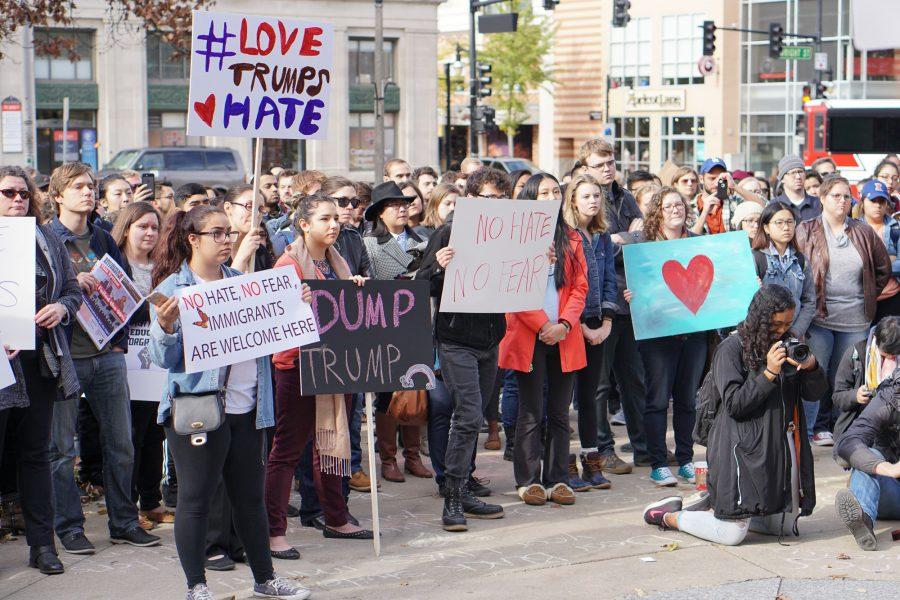Minorities justified in fearing and protesting Trump
Students gather at Alma Mater to march through the Quad and down Green Street in order to protest President Elect Donald Trump on Friday.
Nov 15, 2016
 In the final hours of the presidential election and the days following, Americans shared an outpouring of passion toward the presidential election that has been absent for decades. Hillary Clinton supporters expressed their outrage and disappointment while Donald Trump supporters celebrated with messages of elation.
In the final hours of the presidential election and the days following, Americans shared an outpouring of passion toward the presidential election that has been absent for decades. Hillary Clinton supporters expressed their outrage and disappointment while Donald Trump supporters celebrated with messages of elation.
These messages translated from the computer screen into real life actions. Protesters stormed the streets of several major cities, and our own campus, chanting and wielding signs during rallies to declare that Trump was “not my president.”
Some demeaned these responses by criticizing Americans for being overly emotional and concerned about the future. Others appeared to simply have no concern for the outcome — they were nonchalant to the decisions that are about to influence the country and the world in great magnitude.
However, this apathetic response not only belittles the struggles that many face every day, but it also puts into perspective Americans’ ignorance toward the imminent effects of Trump’s administration.
Trump’s victory was more than “just politics” for a vast number of people. It meant that their families faced the threat of being deported. It meant that a large percentage of their neighbors, coworkers and classmates perceived them as outsiders. It meant that their access to life-supporting medicine or treatment could be taken away with the possible repealment of Obamacare. It meant that they faced the reality of being unable to marry their loved ones.
Get The Daily Illini in your inbox!
Telling these people to “calm down,” or that their responses are unwarranted is dictating another’s actions based on one’s own thoughts and experiences. It’s failing to understand that others may be anticipating changes that influence their ability to live as they did before.
For those that come from a relatively wealthy family or don’t identify with a racial or religious minority group, it may be hard to understand the feelings of being personally attacked based on the way others wrongly perceive you.
This ignorance is an indicator of the prejudice present in our country. This prejudice is due to a lack of knowledge, and a lack of exposure to a diversity of people whose experiences are very different from one’s own.
This isn’t an easy problem to address. There is no one solution to prejudice toward those that look or act different from the majority that spans back centuries.
One way to alleviate issues of ignorance and insensitivity is by encouraging those with diverse backgrounds to communicate among themselves in order to facilitate open conversation among one another and bring about more awareness and understanding of different issues that specific groups face.
Michelle Kiisyo, a senior in social work and multicultural advocate for University Housing, spoke on how cultural insensitivity can be better addressed by students.
“I think it really comes down to making connections with people who are different from you and learning from them,” said Kiisyo. “I think it has to be person-to-person — it makes it more valuable to you because even if you’re hurting someone you’re close to, I think it makes it harder to continue those actions that you’re doing.”
Keeping an open mind and continuously trying to gain perspective from others is just the first step toward building an environment of acceptance in a country that struggles with fearful exclusivity.
Those who believe that the attention surrounding the presidential election is unwarranted have every right to freely express their thoughts, however they must understand that it brings about division rather than the unity that our fractured country so desperately needs.
Minju is a sophomore in Media.






